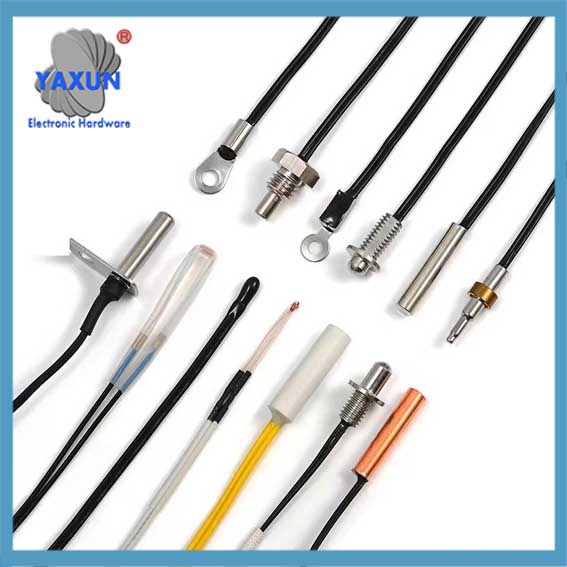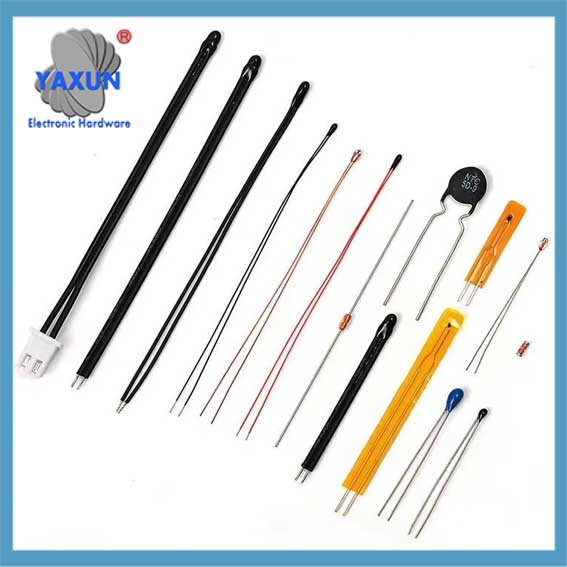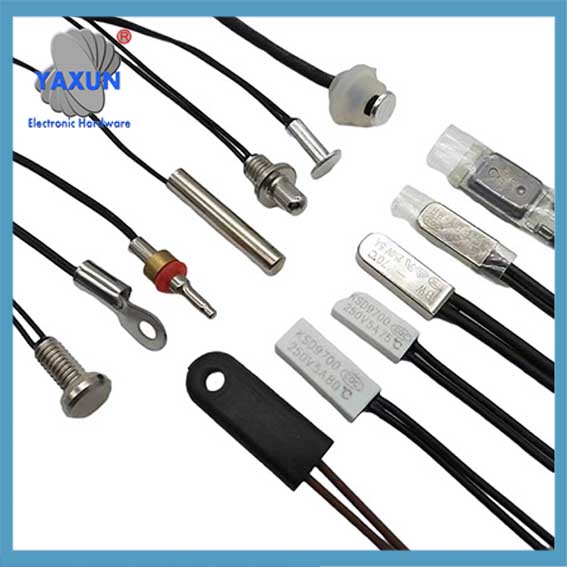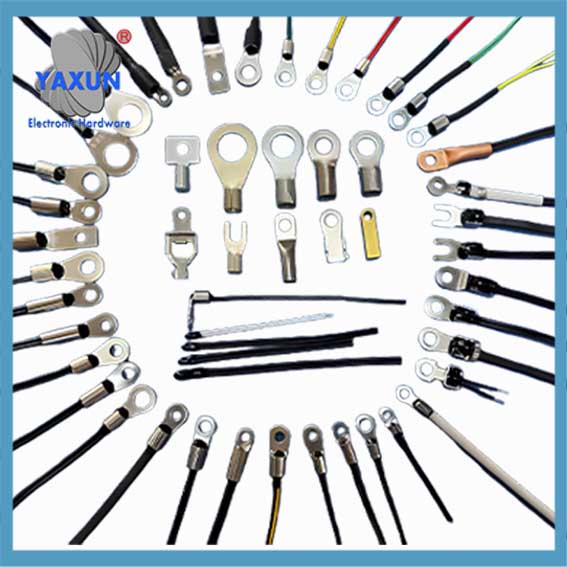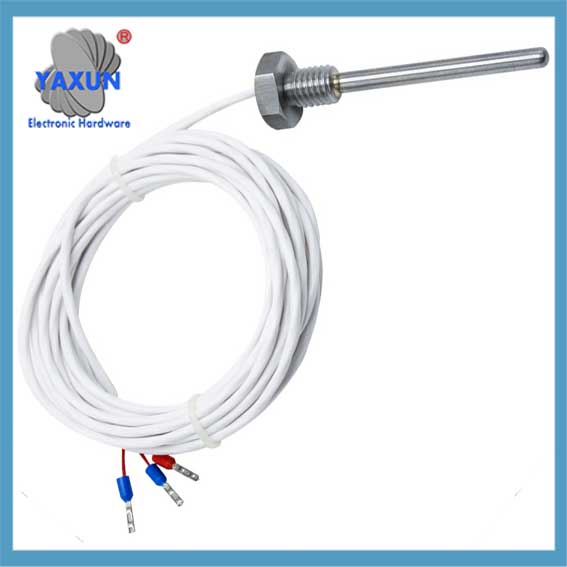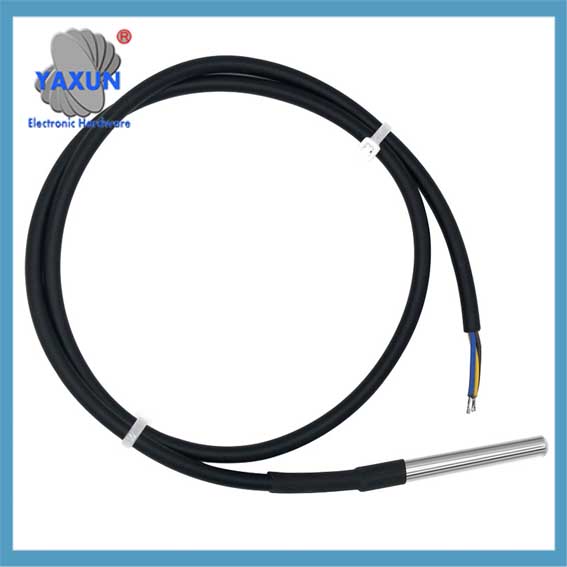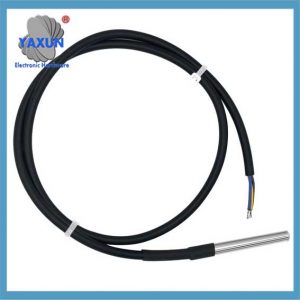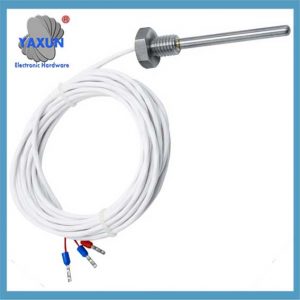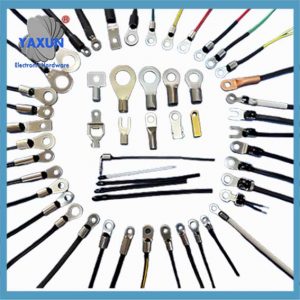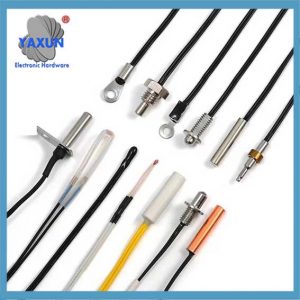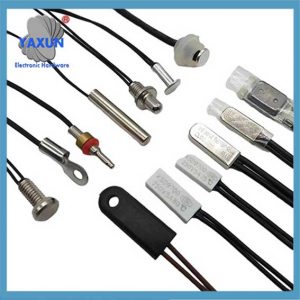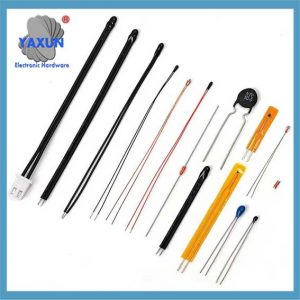Kategori produk
Tag produk
Probe suhu, Jenis Sensor Suhu & aplikasi
Siasatan suhu adalah peranti yang digunakan untuk mengukur suhu, biasanya terdiri daripada elemen sensitif dan litar pengukur. Elemen sensitif boleh menjadi termokopel (PT100, PT1000), Perintang terma (NTC, PTC), semikonduktor (DS18B20 Digital), dll., yang boleh menukar perubahan suhu menjadi isyarat elektrik. Maka ia diperkuatkan, ditapis, ditukar, dan diproses oleh litar pengukur, dan akhirnya isyarat elektrik berkadar dengan suhu adalah output.
Probe suhu dan sensor suhu adalah dua peranti yang berbeza, Dan mereka mempunyai ciri -ciri sendiri dan senario aplikasi dalam mengukur suhu.
Probe suhu
A “probe suhu” adalah sensor yang digunakan untuk mengukur suhu dengan menukar tenaga haba ke dalam isyarat elektrik yang boleh diukur, dan jenis sensor suhu yang paling biasa dalam siasatan termasuk termokopel, Pengesan suhu rintangan (RTS), dan termistor, masing -masing dengan ciri dan aplikasi yang berbeza berdasarkan ketepatan yang diperlukan, julat suhu, dan masa tindak balas diperlukan untuk keadaan tertentu.
Definition: Siasatan suhu adalah peranti yang digunakan untuk mengukur suhu, biasanya terdiri daripada elemen sensitif dan litar pengukur. Elemen sensitif boleh menjadi termokopel (PT100, PT1000), Perintang terma (NTC, PTC), semikonduktor (DS18B20 Digital), dll., yang boleh menukar perubahan suhu menjadi isyarat elektrik. Maka ia diperkuatkan, ditapis, ditukar, dan diproses oleh litar pengukur, dan akhirnya isyarat elektrik berkadar dengan suhu adalah output.
Prinsip kerja: Prinsip kerja siasatan suhu adalah menggunakan tindak balas elemen sensitif kepada perubahan suhu untuk menukar perubahan suhu menjadi isyarat elektrik. Unsur sensitif yang biasa termasuk termokopel, Resistor terma, Semikonduktor, dll. Prinsip kerja termokopel adalah menggunakan kesan termoelektrik dua logam atau aloi yang berbeza. Apabila mereka dihubungkan bersama dan pada suhu yang berbeza, daya elektromotif yang berkadar dengan suhu dihasilkan. Prinsip kerja perintang haba adalah menggunakan harta yang rintangan bahan logam atau semikonduktor berubah dengan suhu. Apabila suhu berubah, Nilai rintangan juga akan berubah dengan sewajarnya. Prinsip kerja semikonduktor adalah menggunakan harta yang kekonduksian bahan semikonduktor berubah dengan suhu. Apabila suhu berubah, kekonduksian juga akan berubah dengan sewajarnya.
Type: Jenis pemeriksaan suhu terutamanya termasuk probe termokopel, Probe Perintang Thermal, Probes Semikonduktor, dll. Probe Thermocouple Gunakan termokopel sebagai elemen sensitif, dan mempunyai ciri -ciri julat pengukuran yang luas, kelajuan tindak balas pantas, dan ketepatan yang tinggi. Probe Perintang Thermal menggunakan perintang termal sebagai elemen sensitif, dan mempunyai ciri -ciri ketepatan pengukuran yang tinggi, kestabilan yang baik, dan kemampuan anti-interference yang kuat. Probe Semikonduktor Gunakan Semikonduktor sebagai Elemen Sensitif, dan mempunyai ciri -ciri saiz kecil, Berat ringan, dan penggunaan kuasa yang rendah.
Application Fields: Probe suhu digunakan secara meluas dalam industri, Penyelidikan saintifik, penjagaan perubatan, perlindungan alam sekitar dan bidang lain. Seperti pengukuran suhu dan kawalan dalam bahan kimia, Petroleum, metalurgi, elektrik, Farmaseutikal, makanan dan industri lain.
Kabel sensor suhu ds18b20 dengan siasatan
Pendawaian: Merah(Vcc), Kuning(Data), Hitam(Gnd)
Julat suhu luas -55 ℃ ~ +125 ℃
Bekalan kuasa: 3.0V ~ 5.5V
Petua: Menggunakan perintang 4.7k antara data dan VCC akan membuat ujian probe lebih mudah.
Thermocouple:
Fungsi: Menghasilkan perbezaan voltan berdasarkan suhu di persimpangan dua wayar logam yang berbeza.
Kelebihan: Julat suhu yang luas (-200° C hingga 1750 ° C.), agak murah, masa tindak balas yang cepat.
Keburukan: Ketepatan yang lebih rendah berbanding dengan sensor lain, Memerlukan jadual penentukuran untuk menukar voltan ke suhu.
Aplikasi: Aplikasi suhu tinggi seperti relau, pemantauan enjin, proses perindustrian.
Thermistor:
Aplikasi Probe Suhu:
Proses perindustrian: Pemantauan suhu dalam proses pembuatan seperti ketuhar, reaktor, dan extruders.
Sistem HVAC: Mengawal suhu bilik di bangunan dengan memantau suhu udara.
Keselamatan makanan: Memantau suhu makanan semasa memasak dan penyimpanan untuk memastikan keselamatan makanan.
Peranti perubatan: Mengukur suhu badan pada pesakit melalui probe yang dimasukkan ke dalam badan.
Industri automotif: Pemantauan suhu penyejuk enjin dan suhu kabin.
Penyelidikan saintifik: Pengukuran suhu yang tepat dalam eksperimen.
Sensor suhu
Definition: Sensor suhu adalah peranti yang boleh menukar perubahan suhu menjadi isyarat elektrik. Biasanya terdiri daripada elemen sensitif dan litar pemprosesan isyarat. Elemen sensitif boleh menjadi termokopel, Perintang Thermal, Semikonduktor, dll. Litar pemprosesan isyarat boleh menjadi litar analog, litar digital, dll., yang bersama -sama menyelesaikan pengambilalihan, pemprosesan dan output isyarat suhu.
Prinsip kerja: Prinsip kerja sensor suhu adalah serupa dengan siasatan suhu. Ia juga menggunakan tindak balas elemen sensitif kepada perubahan suhu untuk menukar perubahan suhu menjadi isyarat elektrik. Walau bagaimanapun, Sensor suhu biasanya mempunyai litar pemprosesan isyarat yang lebih kompleks, yang boleh melakukan pemprosesan yang lebih maju pada isyarat suhu, seperti penukaran digital, Penyimpanan data, komunikasi, dll.
Type: Jenis sensor suhu terutamanya termasuk sensor suhu analog, Sensor suhu digital, dan sensor suhu pintar. Sensor suhu analog mengeluarkan isyarat analog, yang perlu ditukar menjadi isyarat digital melalui penukar analog-ke-digital. Sensor suhu digital secara langsung mengeluarkan isyarat digital, dan mempunyai ciri-ciri kemampuan anti-interference yang kuat, ketepatan tinggi, dan integrasi mudah. Sensor suhu pintar mempunyai fungsi seperti diagnosis diri, penentukuran diri, dan komunikasi, dan dapat merealisasikan pemantauan dan kawalan jauh.
Features: Sensor suhu mempunyai ciri -ciri ketepatan pengukuran yang tinggi, kestabilan yang baik, Keupayaan anti-interferensi yang kuat, dan integrasi mudah. Pelbagai jenis sensor suhu mempunyai ciri yang berbeza, seperti sensor suhu analog memerlukan penukar analog-ke-digital, Sensor suhu digital secara langsung mengeluarkan isyarat digital, dan sensor suhu pintar mempunyai fungsi seperti diagnosis diri, penentukuran diri, dan komunikasi.
Application Fields: Sensor suhu digunakan secara meluas di rumah pintar, Pintar yang boleh dipakai, peralatan perubatan, Automasi Perindustrian, Pemantauan alam sekitar dan bidang lain, seperti penghawa dingin, peti sejuk, mesin basuh, termometer, Sphygmomanometers, Sistem Kawalan Perindustrian, dll.
Cara memilih?
Semasa memilih probe suhu atau sensor suhu, Faktor berikut perlu dipertimbangkan:
Application Environment: Pertimbangkan sama ada persekitaran yang diukur mempunyai syarat khas seperti kekerasan, suhu tinggi, tekanan tinggi, dll., untuk memilih bahan dan tahap perlindungan yang sesuai.
Measurement Range: Pilih sensor yang sesuai mengikut julat suhu yang akan diukur untuk memastikan sensor dapat mengukur dengan tepat dalam julat yang diperlukan.
Keperluan akrab : Pilih sensor dengan ketepatan yang sepadan mengikut keperluan ketepatan aplikasi untuk pengukuran suhu.
COST BUDGET: Pilih sensor kos efektif mengikut kekangan bajet.
Cara menggunakan?
Semasa menggunakan probe suhu atau sensor suhu, Perkara berikut perlu diperhatikan:
Stallation: Pasang dengan betul mengikut arahan pemasangan sensor untuk memastikan sensor bersentuhan dengan objek yang diukur dan mengelakkan kesilapan pengukuran yang disebabkan oleh pemasangan yang tidak betul.
Wiring: Sambungkan garis isyarat dengan betul dan garis kuasa sensor untuk memastikan kestabilan dan ketepatan penghantaran isyarat.
Calibration: Kalibrasi sensor secara berkala untuk memastikan ketepatan pengukurannya memenuhi syarat permohonan.
Maintenation: Bersihkan dan jaga sensor dengan kerap untuk mengelakkan habuk, kotoran, dll. mempengaruhi prestasi pengukuran sensor.
Sensor Probe Suhu adalah salah satu produk penting syarikat YXAUN kami. Kami memberi tumpuan kepada bidang pembuatan pintar dan automasi perindustrian, dan menyediakan satu siri peralatan pengukuran dan kawalan yang tinggi dan stabil, termasuk sensor probe suhu. Sensor probe suhu kami digunakan secara meluas dalam pembuatan perindustrian, pemantauan alam sekitar, pengurusan tenaga dan industri lain dengan ketepatan tinggi mereka, kestabilan dan kebolehsuaian ke persekitaran yang kompleks. Sekiranya anda mempunyai keperluan atau soalan khusus mengenai sensor probe suhu kami, Jangan ragu untuk berunding dengan kami. Kami dengan sepenuh hati akan memberikan anda jawapan dan perkhidmatan profesional. Apa aspek sensor probe suhu yang ingin anda ketahui?
Cara memilih sensor probe suhu yang sesuai?
Semasa memilih sensor probe suhu, Pertimbangkan julat pengukuran suhu, keperluan ketepatan, Persekitaran kelajuan tindak balas dan pemasangan. Contohnya, Thermocouples atau rintangan platinum boleh dipilih untuk persekitaran perindustrian, PT100 untuk ketepatan tinggi, dan termokopel untuk tindak balas yang cepat.
Hubungi kami
Menunggu e -mel anda, Kami akan membalas anda dalam 12 Jam dengan maklumat berharga yang anda perlukan.
 English
English Afrikaans
Afrikaans العربية
العربية বাংলা
বাংলা bosanski jezik
bosanski jezik Български
Български Català
Català 粤语
粤语 中文(简体)
中文(简体) 中文(漢字)
中文(漢字) Hrvatski
Hrvatski Čeština
Čeština Nederlands
Nederlands Eesti keel
Eesti keel Suomi
Suomi Français
Français Deutsch
Deutsch Ελληνικά
Ελληνικά हिन्दी; हिंदी
हिन्दी; हिंदी Magyar
Magyar Bahasa Indonesia
Bahasa Indonesia Italiano
Italiano 日本語
日本語 한국어
한국어 Latviešu valoda
Latviešu valoda Lietuvių kalba
Lietuvių kalba македонски јазик
македонски јазик Bahasa Melayu
Bahasa Melayu Norsk
Norsk پارسی
پارسی Polski
Polski Português
Português Română
Română Русский
Русский Cрпски језик
Cрпски језик Slovenčina
Slovenčina Slovenščina
Slovenščina Español
Español Svenska
Svenska ภาษาไทย
ภาษาไทย Türkçe
Türkçe Українська
Українська اردو
اردو Tiếng Việt
Tiếng Việt
